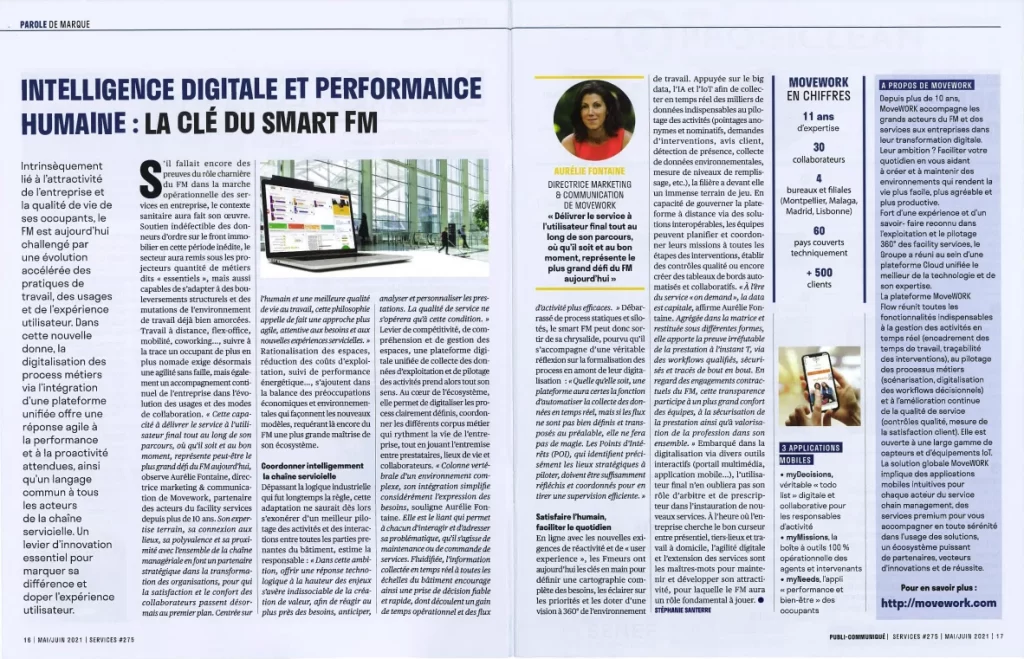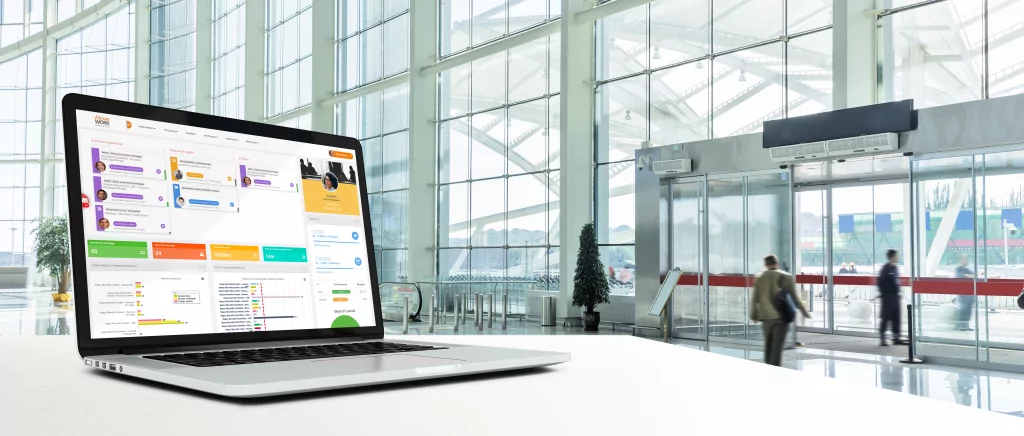
Intrinsically linked to the attractiveness of the company and the quality of life of its occupants, FM is today challenged by accelerated changes in work practices, uses and user experience.
In this new situation, the digitalization of business processes through the integration of a unified platform offers an agile answer to the expected performance and proactivity, as well as a common language for all players in the service chain. An essential lever for innovation to stand out and boost the user experience.
Interview by Stéphanie Santerre for the French magazine SERVICES
If further proof was needed of the pivotal role of FM in the operational running of business services, the health context will have done its work. Unwavering support from clients on the real estate front in this unprecedented period, the sector will have put back in the spotlight a number of so-called “essential” professions, but also capable of adapting to structural upheavals and changes in the environment work already well underway. Remote work, flex-office, mobility, coworking …, tracking an increasingly nomadic occupant now requires flawless agility, but also continuous support for the company in the evolution of uses and modes of collaboration.
“This ability to deliver service to the end user throughout their journey, wherever they are and at the right time, perhaps represents the biggest challenge for FM today,” observes Aurélie Fontaine, Marketing & Communication Director at Movework, a partner of facility services players for more than 10 years. Its field expertise, its connection to places, its versatility and its proximity to the entire management chain make it a strategic partner in the transformation of organizations, for which employee satisfaction and comfort are now at the forefront. Centered on people and a better quality of life at work, this philosophy calls for a more agile approach, attentive to needs and to new service experiences”. Rationalization of spaces, reduction of operating costs, monitoring of energy performance, etc., add to the balance of economic and environmental concerns that shape the new models, again requiring FM to have greater control over its ecosystem.
Intelligently coordinate the service chain
Beyond the industrial logic which was the rule for a long time, this adaptation cannot therefore be exempted from a better management of the activities and interactions between all the stakeholders of the building, estimates Aurélie Fontaine : “In this ambition, to offer a technological answer meeting the challenges is inseparable from the creation of value, in order to react as closely as possible to needs, anticipate, analyze and personalize services. The quality of service will only take place under this condition.”
As a lever for competitiveness, understanding and management of spaces, a unified digital platform for collecting operating data and managing activities then takes on its full meaning. At the heart of the ecosystem, it makes it possible to digitize clearly defined processes, coordinate the different business corpus that punctuate the life of the company, while playing the mediation between service providers, places and employees. “As the backbone of a complex environment, its integration considerably simplifies the expression of needs,” emphasizes Aurélie Fontaine. It is the binder that allows everyone to interact and address their issues, whether it is maintenance or ordering services. Fluidified, the information collected in real time at all levels of the building thus encourages reliable and rapid decision-making, resulting in operational time savings and more efficient activity flows. “

Free from static and silos processes, smart FM can therefore emerge from its chrysalis, provided that it is accompanied by a real thinking on the formalization of processes upstream of their digitalization: “Whatever it is, a platform will have of course, the function of automating data collection in real time, but if the flows are not well defined and transposed beforehand, it will not work magic. Points of Interest (POI), which precisely identify the strategic locations to be piloted, must be sufficiently thought out and coordinated to get efficient supervision. “

Satisfy people, make everyday life easier
In line with the new requirements of responsiveness and “user experience”, the FMers now have the keys in hand to define a complete mapping of needs, enlighten them on priorities and provide them with a 360 ° vision of the business working environment. Based on big data, AI and IoT in order to collect in real time thousands of data essential to the management of activities (anonymous and nominative clockings, requests for interventions, customer reviews, presence detection, collection of environmental data measurement of filling levels, etc.), the sector has a huge playground in front of it. With the ability to govern the platform remotely via interoperable solutions, the teams can plan and coordinate their missions at all stages of the interventions, establish quality controls or even create automated and collaborative dashboards.
“In the era of ‘on demand’ service, data is essential,” says Aurélie Fontaine. Aggregated in the matrix and returned in different forms, it provides irrefutable proof of the service at Time T, via qualified, secure and end-to-end workflows. With regard to the FM’s contractual commitments, this transparency contributes to greater comfort for the teams, to the security of the service as well as to the enhancement of the profession as a whole. ” Embedded in digitization via various interactive tools (multimedia portal, mobile application, etc.), the end user will not forget his role as arbiter and prescriber in the establishment of new services. At a time when companies are looking for the right cursor between face-to-face, third places and homework, digital agility and the extension of services are the key words to maintain and develop their attractiveness, for which FM will have a fundamental role to play.

